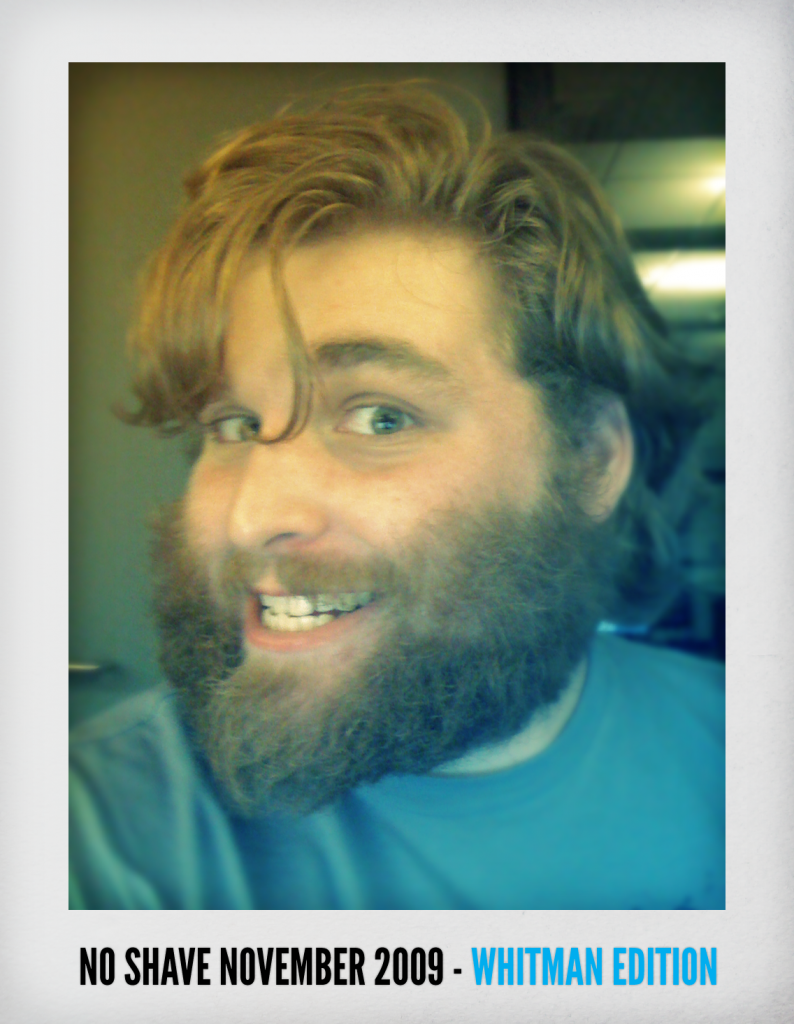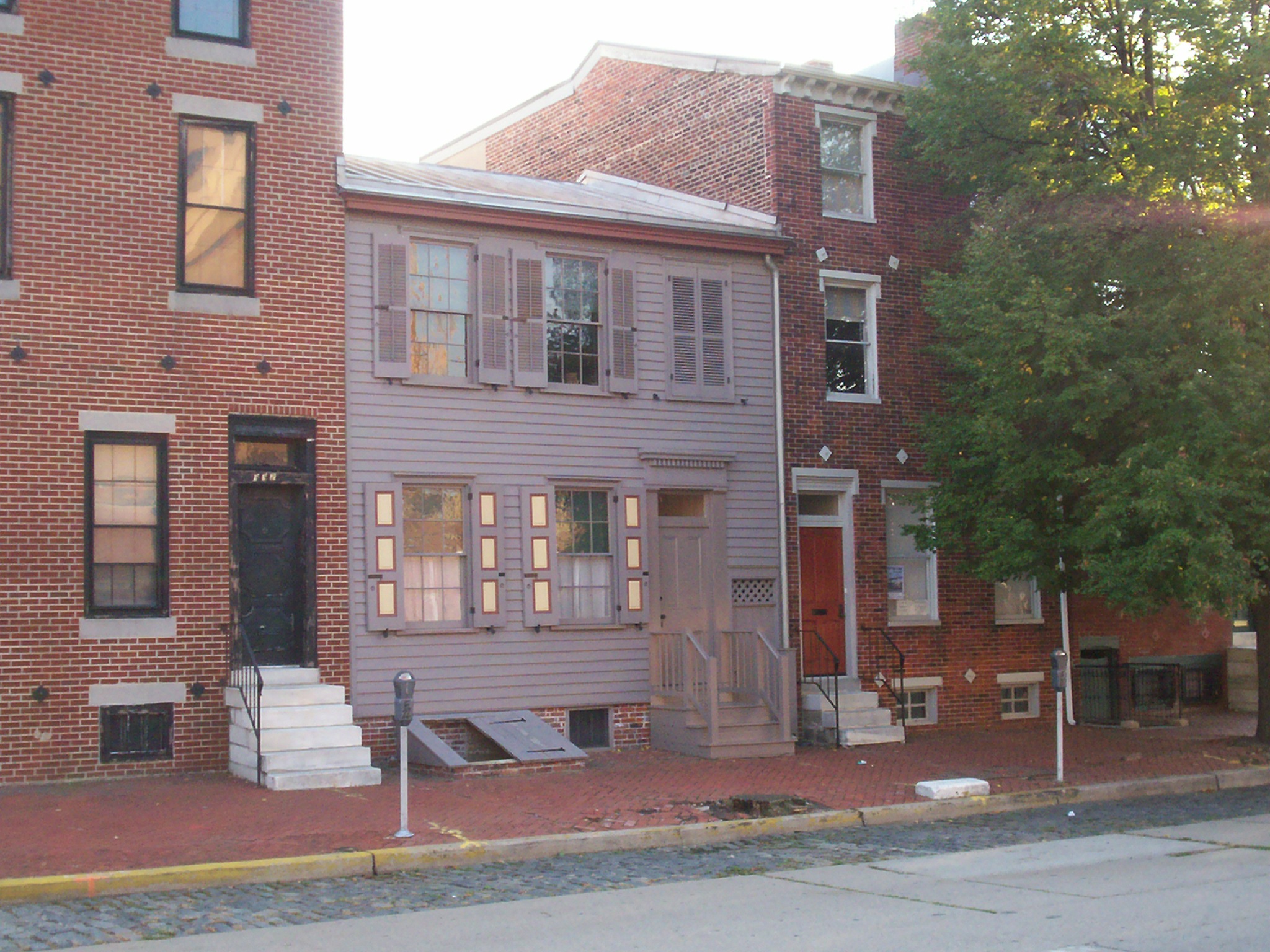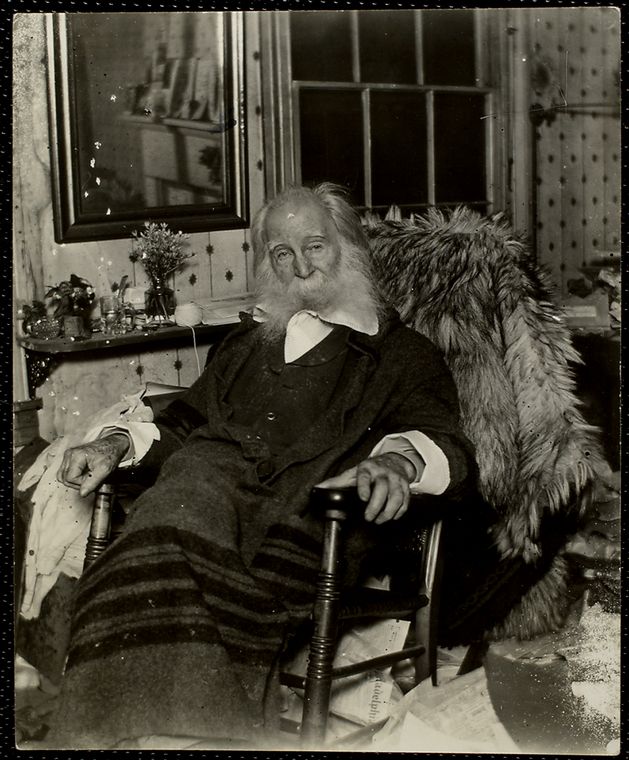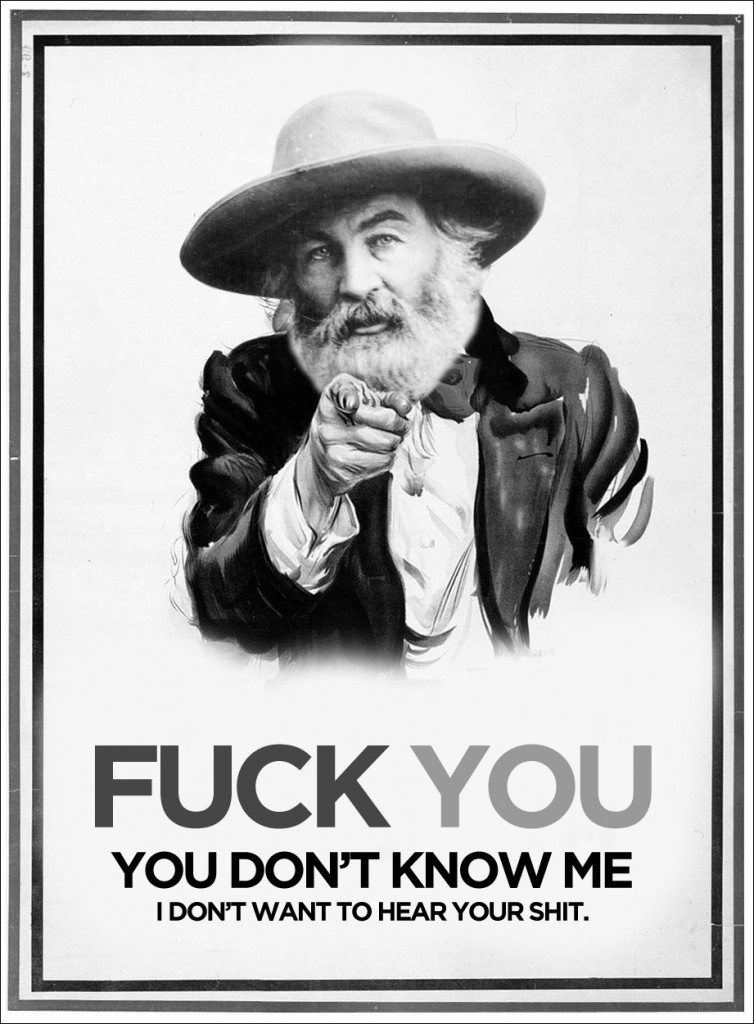Whitman Found (and then FINALLY uploaded to YouTube)
Posted by joefxd in Uncategorized on 12.21.2009
So here’s Erin and mine’s final videos for the class, WordPress is finicky today, so I have the direct links to YouTube below..
Your Friendly Neighborhood Joe D! Reads Walt Whitman’s Thoughts (Parts 1 & 2)
Your Friendly Neighborhood Joe D! Presents Walt Whitman’s A Font of Type
And here’s Erin’s wonderful work!
Erin McCool Reads Walt Whitman’s Years of the Modern
Erin McCool Presents Walt Whitman’s I Sing the Body Electric
Whitman Beard Finale
Posted by joefxd in Uncategorized on 12.02.2009

So No Shave November is over, and as such I’m two days in to MaBeGroMo. I’d like to think Whitman would have dug a beard of this magnitude grown in his honor, since he was, of course, America’s Beardiest Poet.
If Looking for Whitman continues on for the next couple of years I say this should be a reoccurring event. ‘Cause, you know, we’re hot like that.
Annotations for Group 1 (To Thos Who’ve Fail’d, The Bravest Soldiers and A Font of Type, Paumanok.)
Posted by joefxd in Uncategorized on 11.19.2009
To Those Who’ve Fail’d
TO those who’ve fail’d, in aspiration vast,
To unnam’d soldiers fallen in front on the lead,
To calm, devoted engineers – to over-ardent travelers – to pilots on
their ships,
To many a lofty song and picture without recognition – I’d rear
laurel-cover’d monument,
High, high above the rest – To all cut off before their time,
Possess’d by some strange spirit of fire,
Quench’d by an early death.
The Southerners
Civil War
Unnamed soldiers who got shot
The people who profited from the war and reconstruction
No one will know what really happened here
But I’m going to tell them
Everyone who thinks they’re all that and a bag of potato chips
Everyone who died in the war
They were all in a tizzy over the awesome that they were going to do
But then they didn’t
Simplified Version:
People think they know, but they have no idea. Kicking ass might seem like a good idea, until it’s your ass thats kicked. Truth.
The Bravest Soldiers
BRAVE, brave were the soldiers (high named to-day) who lived through
the fight;
But the bravest press’d to the front and fell, unnamed, unknown.
Living posers
Dead O.G.s
Simplified Version:
People telling stories today about how brave they were back then may have just chilled in the back like wussies.
The real hard core guys died on the front lines.
A Font of Type
This latent mine – these unlaunch’d voices – passionate powers,
Wrath, argument, or praise, or comic leer, or prayer devout,
(Not nonpareil, brevier, bourgeois, long primer merely,)
These ocean waves arousable to fury and to death,
Or sooth’d ease and sheeny sun and sleep,
Within the pallid slivers slumbering.
Typeface decision is very important in determining the tone of your message
For instance, loud and impressive Gotham Black, classy Baskerville Italic, overused, but still very nice Trajan, God-forsaken Comic Sans, and its equally agitating side-kick, Papyrus
But all of these typefaces have emotion, unlike Times New Roman, Regular, Size 12, Double Spaced. (Actually he mentions a size 8 and nothing about double spacing, but this is a modern reference to what he’s talking about.)
Ink being printed on a big printing press and drying…
…On white paper
Simplified Version: If you want to make your next paper look really nice, give some thought into the font. I personally recommend Garamond, or Baskerville if you have it.
PAUMANOK
Sea-beauty! stretch’d and basking!
steamers, sails,
And one the Atlantic’s wind caressing, fierce or gentle — mighty
hulls dark-gliding in the distance.
Isle of sweet brooks of drinking-water — healthy air and soil!
Isle of the salty shore and breeze and brine!
Whitman Beard Status Update (Photo!)
Posted by joefxd in Uncategorized on 11.12.2009
So for those who aren’t familiar with No Shave November, it is the celebration of Awesomeness that is Gentleman Beardery. All who can grow beards are invited to celebrate, be they grizzly or grizzle-impaired. And while celebrating for leisure is fully acceptable, members are encouraged to make the most out of No Shave November by dedicating their beard to a cause, or getting sponsored for their beard growth. It is with that in mind that I dedicate this No Shave November beard to the Looking For Whitman Project.

Grow Forth.
So now when people ask me why I haven’t shaved in forever, or make mention of my amazing feat of bearditude, I’ll regale them of the tale of the Looking For Whitman Project.
This, of course, makes total sense seeing how Whitman totally rocked the beard and is probably the beardiest poet in American history.
LINKS!
No Shave November, the month between Octobeard and MaBeGroMo.
The Good Sir Dyers Attempts to Grow All 35 Recognized Beard Types
What I Learned in Class Today 11.5.09
Posted by joefxd in Uncategorized on 11.05.2009
I’m Growing My Whitman Beard.
Posted by joefxd in Uncategorized on 11.05.2009
So this started as an Octobeard that was going in to No Shave November, then I found out about MaBeGroMo and since I’m going to have this throughout the semester, I’m officially dedicating it to Walt Whitman.
(Pictures when I get a camera)
Joe D! Remembers Remembers the Fifth of November
Posted by joefxd in Uncategorized on 11.05.2009
On this day in history:
Guy Faux starts a new holiday in England.
Doc Brown fell in his bathroom and came up with the idea of the Flux Capacitor, the device which makes time travel possible.
V for Vendetta came out in theatres, and quickly spit on the original (and much more awesome) graphic novel.
I blogged about Walt being emo.
So yes. Songs of Parting is when Whitman makes a mixtape of Good Charlotte, Dashboard Confessional and My Chemical Romance, starts shopping at Hot Topic, and changes the background on his MySpace to black to further reflect the dark depths of his soul.
Ok, that may be exaggerating it, but yeah, Whitman knows he’s going to die and this is essentially his swan song.
Although I’m usually proven wrong each week when I get to class and find out that whatever I thought was going on was stupid and there’s actually a much better answer for what Walty meant in his poems, but I’m rolling with “Swan Song” for this one.
Maybe it’s because this is the deathbed Leaves of Grass, and this is the Songs of Parting, and he talked about death and dying the entire time, but I’m going to be shocked if thats a metaphor for anything other than he’s old and about to die.
This, of course kind of saddens me. I’ve developed a caricature of Whitman as a dirty old man who bears a passing resemblance of The Gordon’s Fisherman, and runs about at 2.5 BAC (Blood Awesome Content). But having him talk about dying is a total downer.
Now, of course I know he’s dead. He’s been dead for a while, but it’s still a bummer to have him empty his heart out after we’ve all developed a (albeit small) connection with the guy.
That said, it was a bit Sunny Day Real Estate for my liking. I tend to lean more towards a “Do not got gently into that dark night” flavor in my deathbed poetry, which Walt did jump too quite a few times, there was just a few too many Adam’s Songs in there that got me all :(ed.
Mickle Street
Posted by joefxd in Uncategorized on 10.22.2009

The Whitman House at 330 Mickle Street
During his stay in Camden NJ, Walt Whitman lived at the house on 330 Mickle Street. It was when Louisa Whitman, his mother, grew ill. Walt soon visited her, but she tragically died only three days after he came to Camden. After a brief return to D.C. he would move to Camden to live with his brother George.
Long before Walt Whitman came to Camden, the history of Mickle Street began. In the early 1840’s John W. Mickle had enough pull with the railroad companies and the city of Camden itself that he was able to have a street named after him. This street would soon be located next to elevated railroad tracks which were noisy and would shake the houses as they passed. On this road was a lot owned by Edward sharp since the 1820’s. This would be the spot of the future home of Walt Whitman. Walt acquired the building from Rebbecca Jane Hare in the early 1870’s. Ms. Hare had come in to possession of the house after the original owner, Adam Hare passed away in the early 1870’s.
Up until Walt Whitman was in his mid sixties, he had never owned a house. Instead he would move from area to area, but always paying rent, and never purchasing land outright. That all changed in the spring of 1884. Walt Whitman purchased 330 Mickle Street, a that grew to mimic Whitman’s own laissez-faire outlook of unkempt charm.
Already 50 years old, the little shack, purchased for $1,250 in 1884 (worth $28,288.55 in 2009 money according to the Consumer Price Index), was deemed a mistake by George. He had felt that Walt had overpaid for a run down shack missing various utilities and had fallen in to disrepair.

Whitman circa 1891
Despite the house’s shortcomings, Walt had grown to love it. He would live here from 1884 until his death in 1892. During which time he wrote November Boughs amongst other works including (another) edition of Leaves of Grass.
After his death, the house passed to his brother Edward (whom, unlike George, didn’t totally hate the house), with the one stipulation that Walt’s housekeeper was allowed to live there (paying rent of course). She would continue to do so until Edward soon died and the house moved under the possession of George. George (whom, just to recap, hated the house) kicked our the housekeeper over a petty squabble but would hold on to his brother’s old house until he passed away as well. Jessie Whitman (George, Ed, and Walt’s niece) would later sell the house to the city of Camden almost thirty years after Walt’s death.
After this, the Walt Whitman Foundation was created to look after the estate. Lead by Walt’s former doctor, the Foundation refurbished the house including the furniture, such as his bed and rocking chair. A little over a quarter century later, the New Jersey itself would purchase it and later have it run by the National Park Service.
During the 60’s the nearby railroad tracks were demolished and the Walt Whitman Foundation was changed to the Walt Whitman Association. The neighboring buildings were renovated into libraries and the entire group was turned into a museum.
After the train tracks were taken down, the road was widened and graduated from “street” to “boulevard”. The newly named Mickle Blvd. stayed that way until a campaign in the mid 90’s had a portion of the road changed to Martin Luther Kind Boulevard. The road remains named that today, though the section surrounding Walt Whitman’s house is still referred to as Mickle Street (and can still be searched as such on Google Maps, so hey, if its good enough for Google, its good enough for me).
Going to Rutgers Camden and being located so close to Mickle Street, I went to have a visit. It was after I had gotten off of work, but before it was to late to be safe wandering around Camden (I hate to say that, but yeah). Unfortunately I couldn’t get there on time to get in, (and too dark to take decent photos myself) but I had enough time to wander around and get the feel for what it must have been like for Whitman.
Of course things have changed, if you go there, you can still make out where the train tracks must have been, following the road, causing a ruckus in the old house as the trains passed by Whitman.
Crime (like everywhere else in Camden) has gone up as well. In my research I have discovered that this road was once the head quarters for a major drug dealing ring, as well as the site of at least one murder at a corner Chinese food restaurant.
One has to wonder, what Walt Whitman would have to say about all of this. Surely he would denounce the riots and gangs and drugs that have swept over the area in the past few decades. He would lament the death of Camden’s natural beauty in favor of factories and soup cans and Victrolas. But would he have left?
He enjoyed the house in the first place because it was run down and busted up. Would it make that much of a difference if the city followed suit? As society fell apart alongside his home would he have even noticed? Would he have worried? It’s easy for me to see him as just a stubborn old man who would probably be to much of a hassle for gangs to be bothered with.
Perhaps his poetry as well would be reflective of this. Sure it would be bound to be different. He grew to lament the Civil War, gang warfare at his front door would probably be no different. But set in a gotham setting, in the advent of rap music and Walkmans would he embrace parts of the culture he found outside of his doorway, clamoring to get in?
Imagine a mid 90’s Whitman, rapping his poetry, influencing another whole generation (to anyone who feels that this would be unheard of, I direct you towards the music of Tupac, MF Doom, and Aesop Rock, among others whose music is little more than awe inspiring poetry set to a beat).
Ok, MC Walt Whitman just sounds awesome.
House Photo courtesy of Wikimedia Commons: http://commons.wikimedia.org/wiki/File:WhitmanHouse-CamdenNJ1.jpg
1981 Whitman Photo courtesy of Wikimedia Commons: http://upload.wikimedia.org/wikipedia/commons/2/21/Whitman_by_Reeder_1891.jpg
References:
http://www.whitmanarchive.org/criticism/current/encyclopedia/entry_33.html
http://tps.cr.nps.gov/nhl/detail.cfm?ResourceId=325&ResourceType=Building
http://www.dvrbs.com/camden-streets/CamdenNJ-Streets-MickleStreet.htm
http://micklestreet.rutgers.edu/index.htm
http://www.state.nj.us/dep/parksandforests/historic/whitman/index.html
Hey Look What I Found! Joe D! for 10.8
Posted by joefxd in Uncategorized on 10.08.2009
Here, watch this: Walt Whitman \”O Captain My Captain\” Animation
So I never new that this poem was about the death of Abraham “Slim” Lincoln.
O Captain! My Captain!
O Captain! my Captain! our fearful trip is done,
The ship has weather’d every rack, the prize we sought is won,
The port is near, the bells I hear, the people all exulting,
While follow eyes the steady keel, the vessel grim and daring;
But O heart! heart! heart!
O the bleeding drops of red,
Where on the deck my Captain lies,
Fallen cold and dead.O Captain! my Captain! rise up and hear the bells;
Rise up–for you the flag is flung–for you the bugle trills,
For you bouquets and ribbon’d wreaths–for you the shores a-crowding,
For you they call, the swaying mass, their eager faces turning;
Here Captain! dear father!
This arm beneath your head!
It is some dream that on the deck,
You’ve fallen cold and dead.My Captain does not answer, his lips are pale and still,
My father does not feel my arm, he has no pulse nor will,
The ship is anchor’d safe and sound, its voyage closed and done,
From fearful trip the victor ship comes in with object won;
Exult O shores, and ring O bells!
But I with mournful tread,
Walk the deck my Captain lies,
Fallen cold and dead.
Sure, like most people, I’ve heard it before (it was a major plot point in The Dead Poet Society, a movie which, although thought provoking and enjoyable, influenced a generation of posers and wannabes much like Fight Club or that damned “Why So Serious?” line from Dark Knight, which was awesome in the movie, but when your nerdy friend won’t stop saying it, it kind of looses something, but I digress).
Maybe it was the over-use of the end scene of The Dead Poet Society where all the kids climb up on desks and wage a 5 minute protest before giving up and going back to their oh-so-comfortable status quo of trust funds, over-compensating, and wealthy, but distant, parents. Or maybe it was how the poem itself has been condensed into just the title, as merely making a reference to it seems to be as good as knowing all the lines by heart (again, I blame pompous wannabes and the DPS), but now that I know this poem is a final farewell to the first fallen President of the United States, a symbol of America itself, and the loss of innocence that despite multiple wars and other problems, remained an ideal, a last bastion of unwavering American Spirit, that every time I’ve read this poem before, now seems cheap in comparison.
The country was heartbroken, Walt Whitman himself is clearly distraught over what had happened. While reading the entire selection I could almost picture Walt holding Lincoln in his arms, something akin to Michealangelo’s Pieta (Google it).
As I write this, I’m actually a little pissed at The Dead Poet Society. The death of an American President, a man who fought to save the Union and would be remembered for guiding our nation through one of its darkest hours, was held tantamount to Robin Wiliams being fired for being too zany. This is like FDR’s Day of Infamy speech being shang-hied for an iPod commercial or “I Have a Dream” quoted in a GAP ad. There is a disproportionate level of actual human loss to unnecessary crap.
Or maybe I just need a nap.
Run on sentences FTW!
Joe D! for The Past Couple of Days…
Posted by joefxd in Uncategorized on 10.08.2009
Wow, I’ve been sick, but I’m pretty much back (still have a bit of a headache) and I’m trying to make up for lost time. So here goes nothing:
Walt Whitman is Porn.
Ok, maybe not porn per se, but definitely a slightly-more-than-necessary sex scene in an indie film. You know, like its not smutty or anything, and perhaps even develops the story or strengthens the character’s emotional bonds and allows for personal growth, but the scene kind of carries on for a bit more than you’re comfortable with, and although tasteful and artsy, has a few too many body parts than you figured would be in it when you and your friends decided which film to see while staring at movie posters in the lobby of the Ritz.
Its not bad or naughty or anything, just somehow off-putting.
O Hymen! O Hymenee!
O hymen! O hymenee! why do you tantalize me thus?
O why sting me for a swift moment only?
Why can you not continue? O why do you now cease?
Is it because if you continued beyond the swift moment you would
soon certainly kill me?
See? Surpising. Not bad, I just would have appreciated an NSFW warning as I listened to the mp3 on my iPod in my car with the windows down.
And that wasn’t even the worst best part. He goes on for a while in From Pent-Up Aching Rivers on what might as well be a Harlequin Romance Novel. It had everything but “heaving bosoms” and Fabio on the cover.
I wonder, did the teenagers during the Civil War and Reconstruction take their girlfriends to Make Out Point in their dad’s horse-drawn-carriage and recite Walt Whitman poems instead of seeing slasher flicks at drive ins (or more modernly, watching Netflix/Hulu/OnDemand on thier parent’s couch)? Did kids during this time huddle around in bedrooms, locker rooms, or the middle of the woods in towns across America peering over someone’s dad’s Leaves of Grass? Poor bastards, life must have been hard before the Internet.
And with that, I leave you with fun links:
(Everything is SFW as long as your you have headphones and an employer with a sense of humor)
Porn for the Blind
http://pornfortheblind.org/
“The Internet is for Porn” Song – Avenue Q
http://www.youtube.com/watch?v=T-TA57L0kuc
Wow, I’ve been sick, but I’m pretty much back (still have a bit of a headache) and I’m trying to make up for lost time. So here goes nothing:
Walt Whitman is Porn.Ok, maybe not porn per se, but definitely a slightly-more-than-necessary sex scene in an indie film. You know, like its not smutty or anything, and perhaps even develops the story or strengthens the characters emotional bonds and allows for personal growth, but the scene kind of carries on a bit more than you’re comfortable with and although tasteful and artsy, has a few too many body parts than you figured would be in it when you decided which movie to see while staring at movie posters in the lobby of the Ritz. Its not bad or naughty or anything, just somehow off putting.
O Hymen! O Hymenee!
O hymen! O hymenee! why do you tantalize me thus?
O why sting me for a swift moment only?
Why can you not continue? O why do you now cease?
Is it because if you continued beyond the swift moment you would
soon certainly kill me?That
![Reblog this post [with Zemanta]](../img.zemanta.com/reblog_eda16.png?x-id=213e3cc6-b030-48be-a628-dc420e6e5864)

![Reblog this post [with Zemanta]](../img.zemanta.com/reblog_ed004.png?x-id=0b4901bf-5b0d-40b6-b8b3-d393dc20a1c9)
![Reblog this post [with Zemanta]](../img.zemanta.com/reblog_ec68d.png?x-id=6ef5545e-3474-42f9-9873-44b9073702f4)
